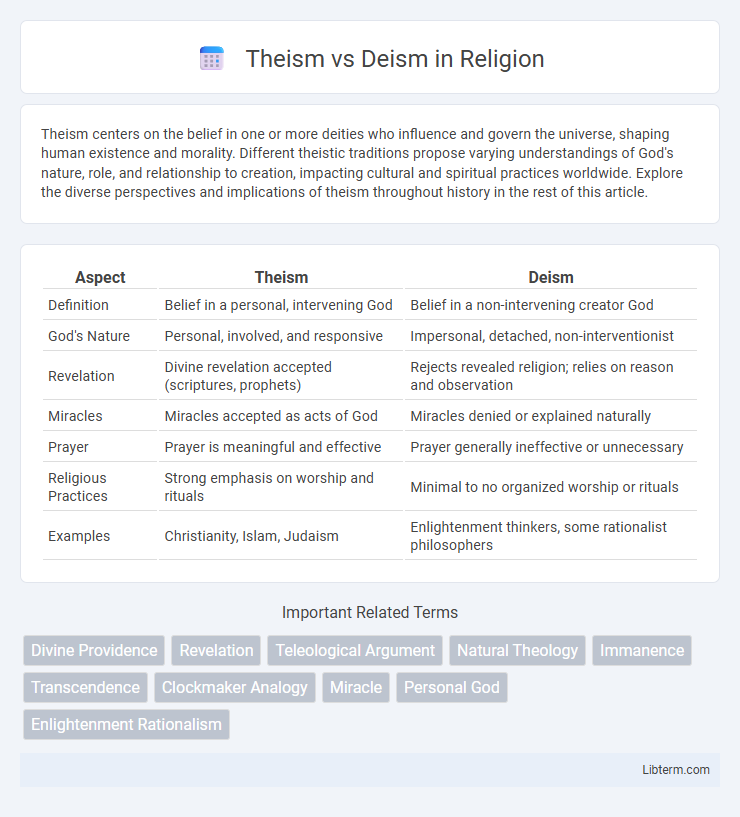Theism centers on the belief in one or more deities who influence and govern the universe, shaping human existence and morality. Different theistic traditions propose varying understandings of God's nature, role, and relationship to creation, impacting cultural and spiritual practices worldwide. Explore the diverse perspectives and implications of theism throughout history in the rest of this article.
Table of Comparison
| Aspect | Theism | Deism |
|---|---|---|
| Definition | Belief in a personal, intervening God | Belief in a non-intervening creator God |
| God's Nature | Personal, involved, and responsive | Impersonal, detached, non-interventionist |
| Revelation | Divine revelation accepted (scriptures, prophets) | Rejects revealed religion; relies on reason and observation |
| Miracles | Miracles accepted as acts of God | Miracles denied or explained naturally |
| Prayer | Prayer is meaningful and effective | Prayer generally ineffective or unnecessary |
| Religious Practices | Strong emphasis on worship and rituals | Minimal to no organized worship or rituals |
| Examples | Christianity, Islam, Judaism | Enlightenment thinkers, some rationalist philosophers |
Introduction to Theism and Deism
Theism asserts the existence of a personal God who actively intervenes in the universe and human affairs, often revealed through sacred texts and religious experiences. Deism acknowledges a creator who designed the cosmos but rejects ongoing divine intervention, emphasizing reason and natural law over revelation. Both frameworks address the origin of the universe but differ significantly in their views on God's relationship with creation and human destiny.
Defining Theism: Core Beliefs
Theism centers on the belief in a personal, interactive God who actively engages with creation through revelation, prayer, and intervention in human affairs. Core beliefs include the existence of a divine being who is omniscient, omnipotent, and benevolent, maintaining a relationship with followers and responding to their spiritual needs. Theistic traditions emphasize moral accountability, divine providence, and scriptural authority as foundational elements of faith.
Understanding Deism: Key Principles
Deism centers on the belief in a rational Creator who designed the universe but does not intervene in its ongoing operations, emphasizing reason and observation rather than revelation or religious dogma. Key principles of Deism include rejection of supernatural miracles, reliance on natural laws as evidence of God's existence, and the view that moral truths are accessible through human reason. This contrasts with Theism, which typically involves belief in a personal God actively involved in human affairs and responsive to prayer.
Historical Origins of Theism and Deism
Theism originated in ancient religious traditions, emphasizing belief in a personal, interventionist God actively engaged in human affairs, as seen in Abrahamic religions dating back thousands of years. Deism emerged during the Enlightenment in the 17th and 18th centuries, promoting reason and natural theology, advocating belief in a non-interventionist Creator who set the universe in motion but does not intervene. Historical figures like John Locke and Voltaire were instrumental in shaping Deist thought, distinguishing it from traditional theism by rejecting revealed religion and miracles.
Key Differences Between Theism and Deism
Theism posits an actively involved God who intervenes in the universe and human affairs, whereas Deism advocates for a non-interventionist creator who set the universe in motion but does not interfere. Theists rely on revealed religions and scriptures as sources of divine knowledge, while Deists emphasize reason and observation of the natural world over sacred texts. Theism supports divine miracles and providence, contrasting with Deism's rejection of supernatural events and emphasis on natural laws.
Views on Divine Intervention
Theism asserts that a personal God actively intervenes in the universe and human affairs through miracles, revelations, and guidance. Deism rejects such intervention, positing that God created the universe but does not interfere with natural laws or human events after creation. Theistic belief emphasizes ongoing divine involvement, while deism supports a more hands-off, non-interventionist perspective on the divine.
Concept of Revelation in Theism vs Deism
Theism holds that divine revelation is a direct communication from God to humanity, often through sacred texts, prophets, or miracles, conveying specific truths and guidance. Deism, by contrast, rejects supernatural revelation, asserting that God's existence and attributes are discernible only through reason and observation of the natural world, not through disclosed scripture or prophetic messages. This fundamental difference shapes the theistic belief in authoritative, revealed knowledge compared to the deistic emphasis on rational inquiry and empirical evidence.
The Role of Scripture and Sacred Texts
Theism asserts that scripture and sacred texts are divinely inspired and authoritative sources of moral guidance and spiritual truth, often serving as a direct link to God's will. Deism, by contrast, typically views such texts as human creations reflecting historical attempts to understand the divine rather than as infallible revelations. The role of sacred texts in theism involves prescribed rituals and doctrines, whereas deism emphasizes reason and observation over scriptural authority.
Influence on Society and Culture
Theism, emphasizing a personal and interventionist God, deeply shapes societal norms, moral values, and rituals, influencing laws and cultural traditions through organized religions. Deism promotes a more rational and naturalistic view of divinity, encouraging scientific inquiry and individual ethics without reliance on revealed scripture or dogma. Both perspectives impact art, education, and political thought by framing humanity's relationship with the divine and authority.
Contemporary Significance and Debates
Contemporary significance of Theism vs Deism centers on their differing views of divine intervention and revelation, influencing debates in philosophy, theology, and science discourse. Theism typically asserts an active, personal God involved in the world, shaping ethical frameworks and spiritual practices, while Deism posits a non-interventionist creator who set natural laws but does not interfere, appealing to rationalism and empirical evidence. Current debates engage issues like the problem of evil, the compatibility of faith and reason, and the role of scripture versus natural theology in understanding the divine.
Theism Infographic

 libterm.com
libterm.com